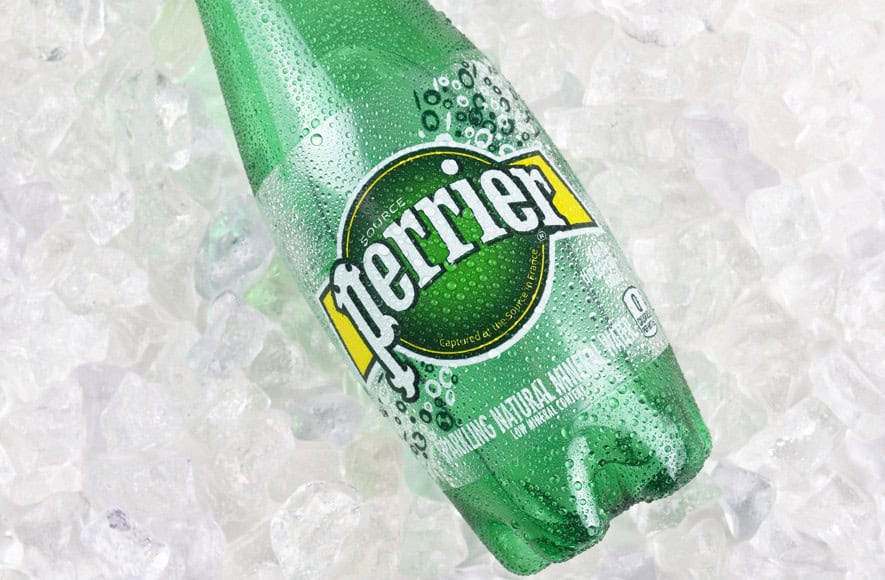
Throughout 2024, bad news continued to bubble up for Perrier, the iconic French brand once marketed as “the champagne of mineral waters.”
In January, its parent company, Nestlé Waters, acknowledged 1 that it had used unauthorized purification methods to address contamination in some of its wells. In April, upon discovering bacteria of fecal origin – the operation of one well was temporarily suspended and nearly three million bottles of Perrier were destroyed. The renewal of Nestlé’s operating permit for the Perrier spring in southern France currently hangs in the balance.
This isn’t the first time that Perrier has faced a contamination crisis. In 1990, at the height of its popularity as a social-drink status symbol, the company implemented a massive voluntary recall after traces of highly toxic benzene were detected in some bottles. A decade later, the New York Times documented the brand’s PR-driven comeback in a June 21, 2001 cover story, “Trying to Sparkle Among the Hip,” 2 as Perrier reinvented its advertising image and sought to reach young influencers at key fashion and entertainment parties in markets like New York, L.A. and Miami.
Status symbols aside, mineral water is supposed to be about natural purity. Other consumer beverages, including some that have touted “healthy” claims, have endured their own legal and public relations scandals. Among them:
- Vitaminwater: The brand has faced lawsuits alleging deceptive advertising. Despite being promoted as nutritious, each 20-ounce bottle contains close to 33 grams of sugar. The company recently launched a zero-sugar line, sweetened with natural alternatives like stevia and monk fruit (3).
- Naked Juice: Promoted as “All Natural” and “Non-GMO,” Naked Juice settled a class-action lawsuit in 2013 for $9 million over allegations of false advertising. The lawsuit claimed the drinks contained synthetic substances and weren’t as natural as advertised (4).
- Snapple: In 2009, Snapple was sued for allegedly misleading consumers by labeling drinks containing high fructose corn syrup as “All Natural.” The lawsuit argued that the labeling led consumers to believe its drinks were healthier than they were (5).
- Celsius Energy Drinks: Marketed as a “fitness drink” with claims of boosting metabolism and burning fat, it has faced lawsuits over its “no preservatives” claim (it contains citric acid) and concerns over high caffeine content (200-300 mg per can), with reports of side effects such as heart palpitations and increased heart rates (6).
These beverage industry controversies trumpet the fact that brands, both established and nascent, cannot scrimp on ethical business practices. This begins with the products themselves. Here are five essential steps that manufacturers can take to ensure safety (and therefore, trust) in beverage production:
- Implement Rigorous Quality Control & Safety Standards: Establish good manufacturing practices (GMPs) to ensure the very highest level of cleanliness and safety. This includes conducting regular testing for contaminants (e.g., heavy metals, pesticides, bacteria) and adhering to FDA, USDA and international food safety regulations.
- Ensure Transparency & Responsibility in the Supply Chain: From sourcing to distribution, maintain full traceability of all ingredients, working with certified suppliers who follow ethical and sustainable practices. Regularly audit suppliers (e.g., farms, factories) to ensure compliance with environmental and labor laws.
- Reduce Sugar & Artificial Additives While Developing Healthier Alternatives: Especially if manufacturers want to clear the FDA’s new high bar (7) of what can be called a “healthy” consumer product, replace added sugars and artificial sweeteners with more natural plant-based ingredients like stevia or fruit purees, and innovate new healthy products.
- Adopt More Sustainable Packaging & Manufacturing Practices: Along with what’s in the bottle, there’s the bottle itself. Shift to recyclable, biodegradable or refillable packaging to reduce plastic waste. Improve water conservation and energy efficiency in production facilities. Reduce carbon emissions by using renewable energy sources.
- Maintain Ethical Marketing & Consumer Education: Provide clear, accurate labeling. Through labels, websites and social media, be transparent about ingredients, sourcing and production methods. Avoid any misleading health claims. Educate consumers on responsible consumption and potential health effects, and support broader initiatives that promote public health and environmental responsibility.
The Perrier controversy, like others in the beverage industry, can have a silver lining. And that’s safer, more honest practices that respect consumers’ health – and their intelligence.
Key Takeaways
- Last year, Perrier used unauthorized purification methods to address contamination in some of its wells in southern France. One well was temporarily suspended and, as a precaution, nearly three million bottles of Perrier were destroyed.
- Beverage industry controversies abound, many which involve lawsuits alleging deceptive and false advertising regarding health benefits.
- The beverage industry can take concrete steps to ensure safety, including implementing more stringent quality control standards, ensuring transparency and responsibility in the supply chain, and maintaining ethical marketing and consumer education.
References
- The Times. Virus Warnings and a String of Scandals May Spell the End for Perrier. https://www.thetimes.co.uk/article/perrier-water-production-health-risks-virus-6cj62j5zq?utm_source=chatgpt.com. December 17, 2024
- The New York Times. Trying to Sparkle Among the Hip. https://www.nytimes.com/2001/06/21/business/the-media-business-advertising-trying-to-sparkle-among-the-hip.html. June 21, 2001
- Top Class Actions. Coca-Cola Reaches Vitaminwater Label Class Action Settlement. https://topclassactions.com/lawsuit-settlements/lawsuit-news/coca-cola-reaches-vitaminwater-label-class-action-settlement/. October 2, 2015
- L.A. Weekly. Naked Juice Settles Suit Over ‘All Natural’ Claims. https://www.laweekly.com/naked-juice-settles-suit-over-all-natural-claims/. July 18, 2013
- Food Navigator. Consumer Case Reopened Against Snapple’s ‘All-Natural’ Labels. https://www.foodnavigator-usa.com/Article/2009/08/14/Consumer-case-reopened-against-Snapple-s-all-natural-labels/. August 13, 2009
- PopSugar. Are Celsius Drinks Bad For You? https://www.popsugar.com/nutrition/are-celsius-drinks-bad-for-you-49231905. October 1, 2024
- FDA Updates “Healthy” Claim, Providing a Refreshed Tool for Consumers. FDA website. https://www.fda.gov/news-events/press-announcements/fda-updates-healthy-claim-providing-refreshed-tool-consumers December 19, 2024


